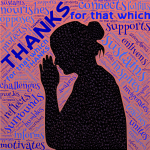Foundationally, feminism is something we can, and should, get behind.
Fifty years ago this month, Norton published Betty Friedan’s influential work The Feminine Mystique, a book commonly credited with inciting second wave feminism in America. The anniversary has incited all kinds of interesting discussions on the web recently as contemporary feminists critique Friedan’s vision and legacy.
I read the book in college, and while disagreeing with quite a few of her conclusions, I really liked it. The book reads like a desperate howl. I found it in some ways inspired (particularly her critiques of media, consumer culture, and advertisements aimed at women – critiques that sadly still have resonance today). And Friedan was right in her primary complaint: women should not be taught to find their satisfaction and value in being excellent little housewives. But though she diagnosed the problem correctly, not all of her solutions or rhetoric were helpful (she spends pages comparing women staying home with their kids to concentration camp victims, for crying out loud). Reading it, I could see why my dad said that feminism was just about women trying to be as selfish as men, putting their own need for self-actualization above anything else.
But in college I also learned that feminism was complicated, and that the beliefs of feminists varied widely; there were other feminisms than Friedan’s second-wave feminism. There were feminists who agreed with my dad’s assessment of second-wave feminism. Feminists who suggested that clamoring for a place at the patriarchal table, playing by patriarchal rules, was the wrong approach. Feminists who critiqued Friedan for focusing solely on the plight of the white, upper-middle class woman, and feminists who suggested that Friedan’s generation left out some essential truths about womanhood.
There were also the (much-older) feminists I had grown up with: my literary heroines like Jo March and Betsy Ray, women for whom feminism simply meant getting equal educational opportunities, the right to vote, to have a job, and to own property.
I had always considered myself a feminist because of books I read growing up. I also considered myself a follower of Jesus, but I found that for some people in the church, feminist was a dirty word. Within conservative evangelical circles, feminism seemed to have a much stricter definition than it did within academia or in popular culture: to the church, feminism meant being pro-abortion and anti-family. Feminists were man-haters and probably lesbians. To the church, feminism was purely an enemy.
Over the years, this cognitive dissonance between what I believed about feminism and what the conservative evangelical church said about feminism started to bother me more and more.
So I’m writing today with a plea. Can we reconsider what feminism means in popular culture today, and how it might relate to our faith?
The three waves of feminism
To start, let’s back up and take a quick look at the historical place of feminism(s) in America. Today when conservative evangelicals decry the role of “feminism” in modern American society, they’re usually concerned about Betty Friedan’s second-wave feminism. But there’s a lot more to feminism than that.
Feminism in America began in the late 19th and early 20th centuries, and while a range of more conservative to more liberal groups rallied under its name, the primary goal of all first wave feminism was female suffrage. They fought for the right to vote. Many of these feminists were also dedicated Christians.
Without feminism, women in America would not have the right to execute a will, to own or manage property, to vote at school meetings, or to engage in business without their husbands’ consent. Without feminism, women would have had no legal recourse against domestic violence or marital rape.
Basically, first-wave feminism fought for women to be allowed to represent themselves as individual adults rather than being only represented by a man. The first wave of feminism is generally considered to have ended with the passage of the 19th Amendment in 1920, granting women the right to vote.
The second wave of feminism began around the time Betty Friedan’s The Feminine Mystique was published. Many women, like Friedan, felt trapped by the “idealized domesticity” portrayed in the media as the primary role for women. Families were in an historically new situation brought about by the Industrial Revolution and the second world war. Prior to the Industrial Revolution, America had been largely agrarian. Many families worked together on the farms; while men and women may have had different roles on the farm, they weren’t working in “separate spheres.” There was no clear distinction between “home” and “work.” After the Industrial Revolution, more and more men began working outside of the home. Then, during World War II, women often worked the factory jobs that men had left vacant while fighting overseas. When the men returned from war and took back their jobs, women returned to the home. New utilitarian, evolutionary models of gender role distinctions – heavily influenced by the work of Freud and Darwin – became an entrenched part of family life in the 1950s. In the post-war prosperity, with distinct “separate spheres” for men and women, and with media representations of women dominated by a singular domestic ideal, many women felt stifled.
Second-wave feminism manifested in a number of ways, some of them legitimately troubling for Christians, and some not. Yes, the feminist movement of the sixties gave us Roe V. Wade, but it also gave us funding for girls to play sports, protection for women against domestic abuse, and establishment of rape crisis and battered women’s shelters. It brought us closer to equal pay for equal work.
Beginning in the 1990s, diverse strains of feminist thought and activity began to be identified as a third wave of feminism. This third wave, in many ways born out of recognition of the failures of the second wave, emphasizes the fact that there is no one “feminism,” and that for decades “feminism” has neglected to acknowledge that women are of many colors, ethnicities, nationalities, religions and cultural backgrounds. While there are aspects of third-wave feminism that are, again, at odds with Christian belief (for example, some third-wave feminists argue that acting in pornography can be good for women, a way of claiming power rather than of being oppressed), the primary truth of third-wave feminism is that feminism doesn’t have a static, unchanged meaning, and that each generation and even each human must define it for themselves.
So, what is feminism, then?
With so many widely varying manifestations, then, what does feminism mean in American culture today?
Though feminists themselves disagree on all kinds of issues, all believe in the political, social, and economic equality of the sexes. Every expression of feminism in America over the last 150 years has this belief in common.
This basic definition of feminism has no conflict with scriptural teaching about men and women. In fact, Christians would add “spiritual equality” to that list. (Whether complementarian or egalitarian, all Christians believe in the priesthood of believers.) Both men and women were created in God’s image (Gen. 1:26-27). Jesus routinely treated women with respect, offering them agency and dignity that their cultures often denied them.
This foundational definition of feminism does not require that we say that there is no difference between men and women. It merely states that men and women should enjoy equal human rights. I believe that this definition, rather than the radical agenda of some second and third-wave feminists, is what most people today associate with the word feminism.
Do we need feminism?
But hasn’t equality for women been achieved? Women can vote, own property, get an education and a job. Isn’t the truth about the full humanity and worth of women so widely accepted in society that we don’t need to fight for it anymore?
That may be true in America, or in some parts of America. Maybe. (Even in America, 1 in 5 women has experienced partner violence.) But how about in the majority world? In the majority world, women are routinely treated as less valuable than men.
One only need look at the statistics about gender-selective abortion to see that female babies are aborted at a much higher rate than males. According to the UN, 100 million girls are missing around the world – aborted, thrown in trash cans, dumped by the side of the road. When families have limited resources, they won’t “waste” them on a girl.
IJM tells us that approximately 80% of human trafficking victims are women and girls, and the FBI warns that in America, there are currently almost 300,000 American youths who are at risk of becoming victims of commercial sexual exploitation. Women are more often treated like “property” than men are.
Half the Sky, a book by by journalists Nicholas Kristof and Sheryl WuDunn, documents many more inequalities women around the globe face today, and the ways that men and women are working to develop create solutions to right those injustices. The problems they find include:
Maternal Mortality: In much of the developing world, women don’t even have the basic right to see a healthcare professional. It’s commonly believed that visiting a doctor or nurse is just not something that a woman should do.
Gender Based Violence: Around the world, as many as one in three women has been beaten, coerced into sex acts or abused in some other way, most often by someone she knows, according to the United Nations Population Fund. This problem is not limited to developing nations.
- Between 15 percent of women in Japan and 70 percent of women in Ethiopia and Peru reported physical and/or sexual violence by an intimate partner.
- The first sexual experience for many women was reported as forced – 24 percent in rural Peru, 28 percent in Tanzania, 30 percent in rural Bangladesh, and 40 percent in South Africa.
Economic Empowerment: Women represent 70 percent of the world’s poor, according to the UN, and fall far behind men in access to land, credit and decent jobs. Being poor means that women have almost no role in decision-making and are increasingly vulnerable to violence.
The fight for full equality of social, economic, and political opportunities for women has not ended. The most foundational tenet of feminism has yet to be accepted in many parts of the world.
Feminism and Faith
I believe that when Christians offer unqualified criticisms of feminism, or frame feminism as an enemy to faith and family, what we unintentionally communicate to many people is that we do not support the full humanity of women.
Let me be clear: There is certainly no denying that some aspects of some feminisms have had negative effects in our culture and are contrary to our faith. But the truth is that many feminists disagree with each other and critique each other, so to use the word “feminism” without any qualification communicates nothing. We don’t need to agree with all aspects of all feminisms to agree with the one foundational tenet that all feminisms hold in common: the idea that women and men are created equal. In fact, as Christians, in the Bible we have the strongest philosophical framework for defining the full personhood of women.
So when conservative evangelicals decry the moral decline caused by “feminism”, we must be much more specific in naming our enemy. Feminism can’t be shorthand for “those women in the sixties who burned their bras and left their families” (that’s clearly a straw woman). When we name feminism an enemy, the world doesn’t hear us saying that we’re against abortion, or against homosexuality, or that we’re pro-family and traditional gender roles. (In fact, first-wave feminism was pro-life, and pro-life feminism is increasing in popularity again today.) I believe that when we call feminism an enemy, most people in our culture today actually hear us saying that we don’t believe in the full personhood of women.
Feminism is the wrong enemy to choose here. Some aspects of capitalism and individualism are also incompatible with Christian belief (and have been just as destructive to family and morality in America as feminism has!), yet we don’t name them as enemies.
In truth, we don’t need “feminism” in order to champion the full human rights of women. We only need the gospel of Jesus Christ. Because we live with the global reality that women are regularly treated as second class citizens, we must contend clearly and vehemently that the gospel of Jesus proclaims that women are fully human, equal in worth and value to men.
But until the day when the church is known for championing the rights of women around the world – until the day when our passion has caused “Christian” to become synonymous with “passionate about the full human rights of women” – let’s quit fighting against the word that most people of my generation already define that way. Let’s give up framing feminism as purely an enemy.
I’m a Christian. And until the day when the world automatically understands that to mean that I believe in the full humanity and personhood of both men and women, you can also call me a feminist.
Illustration courtesy of Seth T. Hahne. Check out his graphic novel and comic review site, Good Ok Bad.















